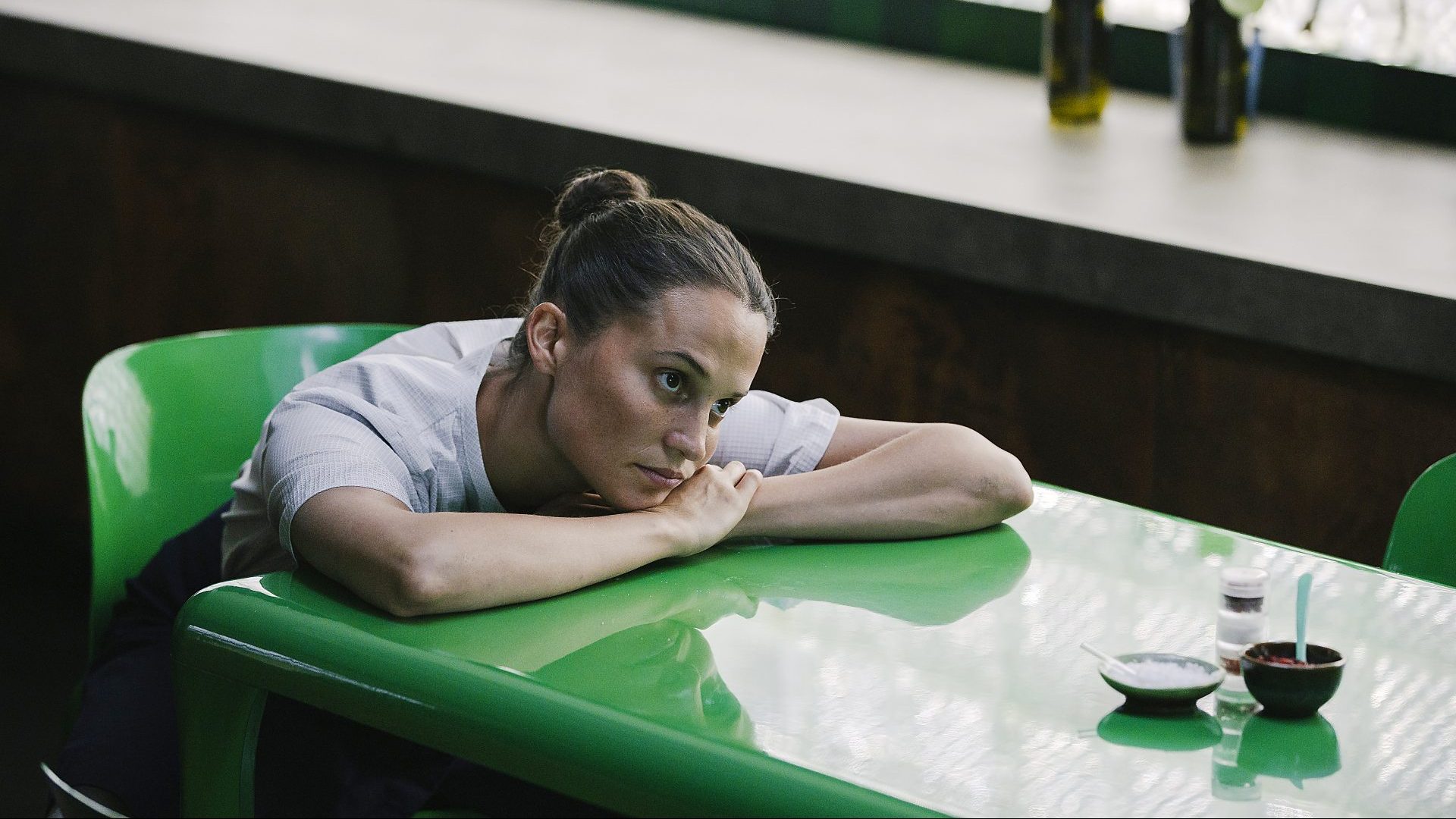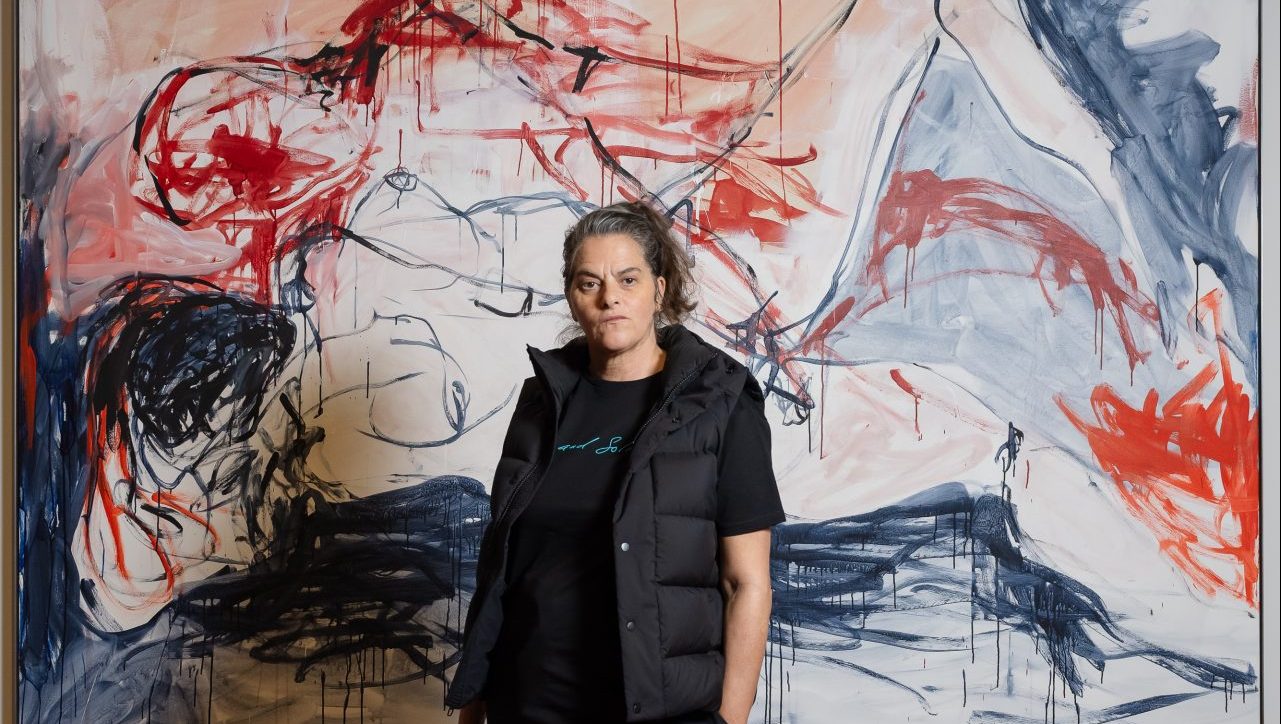Fleur Fortuné’s new film The Assessment is strange, stylish and – it turns out – surprisingly personal. It is set in a dystopian future where permission to have children is only granted after the arduous vetting procedure of the title. Alicia Vikander is the government official, Virginia, tasked with grilling married couple Mia and Aaryan, played respectively by Elizabeth Olsen and Himesh Patel, in order to determine their eligibility to be parents via a week-long series of interviews.
My interview with Fortuné has lower stakes and the atmosphere is considerably less fraught. I’m meeting Fleur at a hotel in Norway, during the Tromsø International Film Festival, where her film is screening. Outside, an atmospheric effect is creating rainbow clouds, scallops of prismed light high in the Arctic winter sky. Fleur is wearing a black polo neck and speaks with a strong French accent.
Fortuné started out as half of the directing duo Fleur&Manu, who gained a considerable reputation directing visually stunning music videos for the likes of Tricky and Drake. Parting ways with partner Emmanuel Cossu, Fleur went solo to direct high-profile ads for Armani and Chanel featuring the likes of Cate Blanchett and Pharrell Williams. A promo for Travis Scott’s song Birds in the Trap pushed the music video format into a 14-minute short movie, half of which is dedicated to setting up the context for the song – a near-fatal car accident with hints of Gaspar Noé’s Enter the Void.
The move to a feature film was the obvious next step. “I didn’t write the script for The Assessment,” she tells me. “During lockdown, I was writing another script in French and a friend of mine who was a producer, Eric Tavitian, met with Steven Woolley, the producer on the project. And Eric knew I was struggling to have kids. I was doing a lot of IVF and adoption meetings, and all that. He read the script of The Assessment and he said to Steven, ‘I think you should meet with Fleur.’”
Fleur immediately empathised with the characters in the film, having gone through her own tortured path to becoming a mother. “I was connected emotionally to the story. I met with the writers Neil Garfath-Cox and Dave Thomas and they were super happy to collaborate. So we worked together for a couple of years. There was so much dialogue that we brought in another writer who was more like a playwright, John Donnelly, and who helped with the humour and to set the specific weird tone I wanted.”
The film is basically a three-hander, a ménage à trois of awkwardness, as Virginia’s assessment starts to cross lines of intimacy and normalcy. Mia and Aaryan’s desperation to be parents traps them in a growing nightmare of roleplay and shifting power dynamics.
This is a stripped-down science fiction film, where the most impressive special effects are in the performances. Particularly, Vikander as the arch-manipulator who plays at being a child and Olsen as a woman full of raw maternal yearning. “Because I come from a very visual background, what was stressing me the most was that I was doing almost a chamber piece in English, which is not my language, with tons of dialogue. So directing actors was my biggest worry.”
This meant that the casting had to be spot-on. “We discussed it for four years, so I knew some names were wrong and some names were going to be great,” Fleur says. Following her prolonged tenure in the Marvel Cinematic Universe, Olsen was the first to sign on. Oscar-winner Vikander joined next, and Patel, whose career has spanned everything from EastEnders to HBO’s Station Eleven, completed the trio of leads within the year. “Once we agree on the story and the angle, the actors do all the work. I create a safe creative space, then I can concentrate more on the universe, the visual side and the tone, and the actors do the rest.”
With the overturning of Roe v Wade in the United States and a push back on reproductive rights across the world, the film strikes a topical note. “Because we developed the film for five years, it became more and more real. It started as a nice idea, but this wasn’t that much of a subject five or six years ago.” The political subtext is brought out explicitly in a nightmarish dinner party, organised by the assessor, and which sees Minnie Driver, Indira Varma, Nichola Pinnock and Charlotte Ritchie show up as various friends and exes from hell.
“We took four days to shoot that scene, even though it was a 30-day shoot in total. It was great, because for so long it was just Alicia, Elizabeth and Himesh in the house, and then suddenly there were four days when everyone was here.”
We’re living in an age where dystopias have to run just to keep up with reality and depicting the future presents its own problems. “Now change is exponential,” Fleur says. “When we didn’t have the internet, it was slower, but right now it’s crazy. It’s going to be dated in six months.
“So I took out all the devices, and then I tried to create a world that would feel a little bit futuristic, but with elements we know so that you can relate to them emotionally. With the production designer Jan Houllevigue, we had references from the ’70s and then you feed a lot of stuff from the location.”
Shot in Tenerife, the setting gives the film its otherworldly and vaguely post-apocalyptic flavour. “It’s volcanic, and very intense, and windy. When we were there, we discussed and said: OK, there’s no forest any more. So there’s no wood. So everything comes from the sand, which means glass, concrete. It helps you create a world. Mia and Aaryan’s house in the rocks is a troglodyte house. And then it comes from the characters. So Mia’s greenhouse is very much like her: very human. She can fix and touch things herself.” Meanwhile, Aaryan creates hyper-real VR animals as pets in the basement in a pitch black space in the basement: “He has nothing, which is basically what we are going towards: a kind of nothingness.”
Fleur has several new projects lined up: a script she is writing in French as well as a potential adaptation of Giuseppe Berto’s novel The Anonymous Venetian, working from a script by Ilaria Bernardini and produced by Francesco Melzi d’Eril, Luca Guadagnino’s collaborator.
“We are rewriting with an angle on the female character because that book was written in the ’60s, so it’s more centred on the male lead. The balance is better. It’s more centered on her and the problems are different also. But I love the setup of having just two characters, a simple story. Another chamber piece.”
Outside the rainbow clouds have disappeared and the short day is already darkening. The Assessment likewise offers a dim view of our prospects, but its director is an exciting new talent and a career to be watched.
The Assessment is released in the UK on April 3
John Bleasdale is a writer, film journalist and novelist based in Italy



